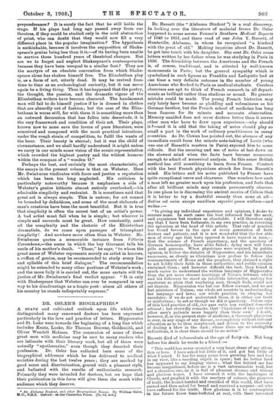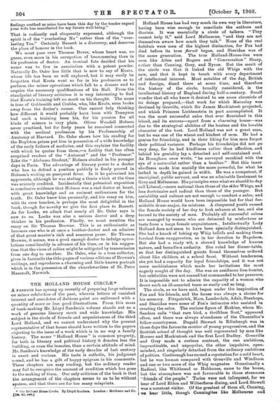DR. OSLER'S BIOGRAPHIES.*
A SUAVE and cultivated outlook upon life which has distinguished many renowned doctors has been expressed particularly in the love and practice of letters. Hippocrates and St. Luke were towards the beginning of a long line which includes Keats, Locke, Sir Thomas Browne, Goldsmith, and Oliver Wendell Holmes. The connexion of some of these great men with medicine may be new to many readers who are intimate with their literary work, but all of them were actually " apothecaries," even though they deserted their profession. Dr. Osler has collected here some of the biographical addresses which he has delivered to medical societies daring the last twelve years ; they are marked by good sense and discrimination, graced with a pleasant style, and ballasted with the results of enthusiastic research. Primarily they were intended for doctors, but we hope that their publication in this form will give them the much wider audience which they deserve.
* An Alabama Student, and other Biographical Essays. By William Osier, F.B.S. Oxford: at the Clarendon Press. [7s. 6d, net.] Dr. Bassett (the " Alabama Student is a real discovery. In looking over the literature of malarial fevers Dr. Osler happened to come across Fenner'a Southern Medical Reports of 1849 to 1851, and there read of one John Y. Bassett, of Huntsville, Alabama, in whom he recognised "a kindred with the great of old." Making inquiries about Dr. Bassett, he got into touch with his daughter. She sent Dr. Osier some letters written by her father when he was studying in Paris in 1836. The friendship between the Americans and the French is, of coarse, traditional, and is attested by well-known monuments in Paris; but the general sympathy which is symbolised in such figures as Franklin and Lafayette had at one time a very definite outcome in the number of young Americans who flocked to Paris as medical students. Careless observers are apt to think of French research in all depart- inents as brilliant rather than studious or sound. No greater mistake could be made. The young French historian may only lately have become as plodding and voluminous as his German brother, but the French school of medicine has long been famous for its minute and accurate observation. Memory unaided does not serve doctors better than it serves other men who have to draw upon experience—why should it ?—and it is odd that the taking of notes should play so small a part in the work of ordinary practitioners in many countries. As Dr. Cowan has pointed out, the absence of any immediate result from the minute note-taking of Louis (who was one of Bassett's masters in Paris) exposed him to some ridicule. But the meaning and use of notes at last dawn on the slowest mind when the facts have become numerous enough to admit of numerical analysis. In this sense British method has still something to learn from France. Contact with the best French physicians struck fire from Bassett's mind. His letters and his notes published by Fenner have quite exceptional verve and clearness. One wonders how such a man left no greater mark upon his profession, and feels that after all brilliant minds may remain permanently obscure. In one place he is discussing the ancient maxim of Celsus that it is better to try a doubtful remedy than none at all- Satius est enim anceps auxilium experiri quasi nullum—and writes :— "In giving my individual experience and opinions, I desire to censure none. In such cases the best informed fear the most, and experience but renders us charitable. I will therefore only say that I have been fortunate, in my own practice, in reversing the aphorism at the head of this article. That rule of practice has found favour in the eyes of every generation of both doctors and patients, and it is not wonderful that the few able men of every age that have opposed it have warred in vain,— that the science of French expectancy, and the quackery of German homoeopathy, have alike failed ; dying men will have pills and parsons. When physicians were required, by public opinion, to follow the dictates of Hippocrates, and his immediate successors, as closely as Christians now profess to follow the commandments of Moses and the prophets, they claimed a right to act boldly their faith in these authorities, and public opinion sustained them ; and however difficult the task, they found it much easier to understand the written language of Hippocrates than the yet more obscure teachings of Nature, between which and his followers he stood an infallible interprotor, making her mysteries so plain that wayfaring men, though fools, could not err therein. Hippocrates was but our fellow servant, and wo are but ministers of Nature; our whole art consists in understanding her language and laws; our whole practice, in obeying her mandates : if we do not understand them, it is either our fault or misfortune; to act as though we did is quackery. Colsus says of this bold practice of old, fere quos ratio non restituit temeritas adiuvat ; but shrewdly remarks, that 'Physicians of this sort diet other men's patients more happily than their own.' I doubt, however, if, in the present state of medicine, a thorough physician is over, in any stage of any disease, so completely without rational education as to be thus nonplussed, and driven to the necessity of dealing a blow in the dark ; where there are no intelligible indications, it is clear there should be no action."
Bassett died of tuberculosis at the age of forty-six. Not long before his death he wrote to a friend :— " This world has never occupied a very large share of my atten- tion or love. I have asked but little of it, and got but little of what I asked. It has for many years been growing less and less in my view, like a receding object in space ; but no better land has appeared to my longing vision ; what lies behind me has become insignificant, before me is a vast interminable void, but not a cheerless one, as it is full of pleasant dreams and visions and glorious hopes. I have covered it with the landscapes of Claude, and peopled it with the martyrs of science, the pioneers of truth, the hound-hunted and crucified of this world, that have earned and then asked for bread and received a serpent—all who have suffered for the truth. How glorious it is to contemplate in the future these time-buffeted at rest, with their lacerated
feelings soothed as mine have been this day by the tender regard your wife has manifested for my future well-being."
That is radiantly and eloquently expressed, although the spirit is of the " everlasting No" rather than of the "ever- lasting Yea." Certainly Bassett is a discovery, and deserves the place of honour in the book.
We must pass over Thomas Dover, whose heart was, we guess, even more in his occupation of buccaneering than in his profession of doctor. An ironical fate decided that his name was to live in association with a potent powder. Naturally Dr. Osier has little that is new to say of Keats, whose life has been so well explored, but it may easily be forgotten that Keats went so far in his profession as to perform the minor operations which fall to a dresser and to acquire the necessary qualifications of his Hall. From the • standpoint of literary criticism it is very interesting to find that Keats's training left no mark on his thought. The same is true of Goldsmith and Crabbe, who, like Keats, soon broke away from the doctor's career. One cannot help thinking how different it would probably have been with Tennyson had such a training been his, for his passion for all kinds of science is very plain. Oliver Wendell .Holmes never practised, but for forty years he remained connected with the medical profession by his Professorship of Anatomy at Harvard. Dr. Osier shows how his reading for the Boylston prizes put him in possession of a wide knowledge of the early fathers of medicine, and this explains the facility with which he quotes from them,—a facility that has often surprised readers of the " Autocrat " and the " Professor." Like the " Alabama Student," Holmes studied in his younger days in Paris. The advantage of literary power to a doctor who has to defend a position publicly is finely proved in Holmes's writing on puerperal fever. In it he pulverised his opponents, although be was stating a thesis which at the time was scarcely credited. Incidentally that polemical exposition is conclusive evidence that Holmes was a real doctor at heart, with great knowledge and an eminent enthusiasm for the truth. Dr. Osler knew him personally, and his essay on him, with its sure touches, is perhaps the most delightful in the book, though for novelty we give the first place to Bassett.
. As for Locke, we admit that nearly all Dr. Osier says is new to us. Locke was also a serious doctor and a deep thinker in his profession. Finally, we must mention the essay on Sir Thomas Browne. This is as enthusiastic as becomes one who is at once a brother-doctor and an admirer of that great master's rich and sonorous prose. Sir Thomas Browne, it seems, was a good enough doctor to indulge specu- lations considerably in advance of his time, as in his sugges- tion that the virus of rabies might be mitigated by transmission from one dog to another. Dr. Osier, who is a true collector, gives in facsimile the title-pages of various editions of Browne's writings, and reproduces a charming and little-known portrait which is in the possession of the churchwardens of St. Peter • Maucroft, Norwich.

























































 Previous page
Previous page